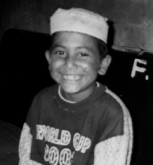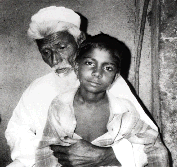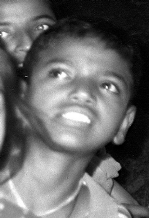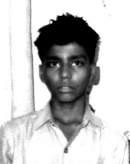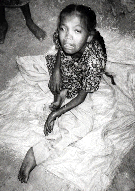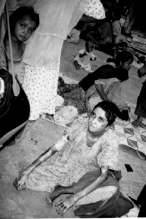| Home |
| What is New |
| What You Can Do |
| Relief - Rehabilitation |
| News / Analysis |
| Reports |
| Women |
| A Cry for Justice |
| Community Response |
| Corporate Social Responsibility |
| Links |
| Site Map |
| home > Reports > The Next Generation: In the Wake of the Genocide, July 2002 | ||||||
|
The Next Generation: In the Wake of the Genocide
A Report on the Impact of the Gujarat Pogrom on Children and the Young July 2002 by an independent team of citizens Kavita Panjabi, Krishna Bandopadhyay, Bolan Gangopadhyay Supported by Citizens' Initiative, Ahmedabad Experiences of Carnage
ENDURING TRAUMA - WITNESSING RAPES, MURDERS, BURNING In every minority camp the organizers and parents told us that when the children first arrived, they were severely traumatized; they could not sleep - and if they did, then they woke up howling with fear in the middle of the night. Many had gone completely silent, others would cry quietly through the day, while some would play, re-enacting amongst themselves the attacks and murders, the violence and arson, that they had survived. While some children interacted with us normally, most in each camp still showed signs of acute depression and trauma. In Shahpur, the majority camp, the children were initially a bit wary, then they relaxed in warm and friendly conversation, specially after the organizers left us alone with them. One striking factor about the majority camps is that, unlike the minority camps, these are populated only by the poorest sections of the community1. Most of the people in these camps left their homes in a fear exodus, either as the fires in the neighbouring minority areas which had been set ablaze threatened to destroy their homes, or in anticipation of retaliatory attacks. As a result, some of the children in the Shahpur camp had actually seen their homes burnt, or even looted "by sword wielding men", but were confused about the identity of these men. Some said they were the same who attacked their neighbours of the other community, others said they were miyas. None of the children had witnessed a single murder, rape or burning of any human being. This team did not see any such evidence of trauma in these children: however, their narratives, like those of minority children, were rife with confusion about the role played by neighbours of the other community, and questions of trust and hostility. Hence we include their testimonies in the appendix, in "Perceptions of the young regarding the "other" community/neighbours" 2. As we talked to various other people, Saddam sat with us, a cheerful grin on his face. It took us time to realize that this grin never left his face - it was the wall he had set up between himself and the world. The patches of eczema on his arms betrayed the traumatized state of his mind. Latifabehn, one of the camp organizers, told us: "He just sits there silently; he talks if you feed him." His brothers, Mohsin (12 years) and Yakub (10 years), flanking him protectively, one on either side, maintained a stoical silence right through. Latifabehn gave Saddam a thick nutrition tablet to chew on, and he started to talk:
"I used to live with my mother Amina Bibi and these two brothers. When the tolä arrived in our village, my brothers were not there. My mother had 60 rupees with her. When the tola of 30-40 men attacked us, she stuffed the 60 rupees into my hand and pushed me into a run. I ran. But then I saw the men get hold of the women and I could not make myself run any more..... I hid myself......(his eyes started to wander into space)...then.....then they stripped my mother naked......." As he uttered "usko nanga kar diya", his grin broadened, then he clamped his eyes shut and buried his face in his arm. It was painful to see this child lift his head again, very soon, and try to continue. We could not bear to hear him narrate the rest himself and stopped him. Latifabehn later told us what she had heard from him. "He saw the brutal rape of his mother. His neighbour Bilkees3 and her sister were also there with Amina. They managed to run away, only to be gang raped 3 days later by another tola. He saw his mother raped successively by 3-4 men, then he saw them chop off her head and hack her body with sickle and talwars (swords).....After the tola left Saddam found only dead bodies around him He started to run in a frenzy. When he got tired, he would stop, buy himself some food from the 60 rupees his mother had given him, then start walking again. Ultimately he reached a police station. The police located his mama (maternal uncle) in Baria and handed Saddam over to him. His mama brought him to the camp where he met up with his two brothers. Now all three say they do not want to go anywhere else. Not "home" to Randikpur - where the 60-70 Muslim houses have all been burnt - and not to Baria with their mama either." Regarding the boys future, Latifa said firmly, "We will not force them to go where they do not want to go. They are too scared. They will stay right here with us. They can then go to the madrasah, they will be educated there and can live in the yateemkhana (orphanage) of the madrasah." "Saddam regularly weeps in his sleep. `I will kill them if I see them.......I was scared then, but I recognized them, they are from the nearby villages....I remember their faces.' he says" ended Latifa.
Juned Salim Sheikh: 7 yrs. resident of Anjanwa village, Panchmahals district. We first met Juned, another orphan, with Saddam in the Iqbal High School camp. He sat with us with a vacant wide-eyed look, neck bent at an angle, head falling into chest, like he had lost all interest in holding it up. Nothing interested him - food, crayons and drawing sheets, conversation - he remained unresponsive with just this numbness in his eyes. The only time they flickered was when we asked him if he had anybody of his own in this camp, and he whispered, "Dadaji" (grandfather). We met Abdul Rahim Ahmed, his dadaji, very briefly that day. Dadaji just said "Uska dimag ab theek nahin hai - Something is wrong with his mind now.......3-4 whole day he stayed hungry, kept fleeing from one place to another.........the horrors he witnessed, houses looted and burnt, 13 people killed, much more........all this has affected his mind. Now the child asks after the cows and buffaloes, and says, `Is this our home'?" Juned's eyes haunted us through the night. Instead of setting straight out for Kalol in the morning we decided to go back to his dadaji first. At Iqbal High School we were told that the group from Anjanwa had left - they had been shifted to Satpul where the camp was relocating. Fortunately Latifa arrived early - she had left the housework to her daughter so she could come and meet us before we left. She showed us the way to Satpul where we found Juned and dadaji, Juned's dadi (grandmother) Amina, their daughter Rabia, and daughter's young son-in-law Faroukh. Juned sat curled listlessly in dadaji's lap as the latter spoke:
He continued, "Three days later Maqsooda was recovered from the well.......we found her still alive.......her children were dead. Juned witnessed all this with us, with his dadi and me.......his mind did not function like this earlier....now he asks, `Is this our home?' He is mind is boggled now, earlier he used to be fine. Now he wakes up in his sleep and starts running away, he shouts, `Run! Run!'" Then Juned's grandmother spoke up, "My daughter Rabia's daughter-in-law, Zubeida was also killed and thrown into the well. Zubeida's 2 yr. old son Adnan was killed too." She was unwilling to comment on exactly what happened to the women in her family. Maqsooda had earlier started telling her story in the camp. She had now been sent away from the camp, to be with her husband Hanif who is elsewhere, recovering from T.B. At this point, Rabia, who had been listening quietly, burst out, "When the tolas came, we started running for our lives. I got separated from my son Farooqand his family. Then I ran into an adivasi who asked me to remove my clothes, `to become one with him', to take on his religion.....I pretended to agree to his demand, but asked him to give me water and clothes first......then I managed to run away into the jungle. The next day I went to the police, took them to the well, and got the bodies pulled out of the well, got their names written.
While dadaji and Rabia were talking to one of us, another member of our team noticed a youth of around 22 years sitting close by with a numb look on his face. He did not answer when asked his name. Upon a repeated query; his lips moved a little but he failed to speak. Then a voice answered "I am Mohammed, he is my son Farooq. Farooq is also Juned's aunt's son." Mohammed continued: A few days back we had celebrated Id with full vigour. Some relatives were also staying at our place. It was around 2.30 in the afternoon when Farooq saw a huge mob coming to attack us with sharp weapons in hand. We all started to run. Unluckily my family was gheraoed by the attackers. They started forcing us to utter "Jai Sia Ram". And then they plunged swords into the bodies of 5 members of our family. Their deadbodies were mauled thrown into the nearby well. They killed Juned's aunt and her two children with swords and threw their bodies into the well. Farooq was escaping along with his wife Zubeda and son Adnan. At first they hit Farooq and snatched Adnan from his lap....."
Farooq finally opened his mouth "They snatched Adnan from me and even pulled Zubeida away. I hid myself behind the bush. From there I saw Zubeida being stripped and raped by the Bajrang Dal people. After that they killed her, cut her into two halves and threw the pieces into the well." Tears streamed down his face momentarily, "they even killed my one and half year old Adnan and threw him into the well. Then they burnt our house." As we left, all were crying bitterly to themselves except Farooq. One of us held his hands firmly and could feel that they were trembling - a sudden grim look in his eyes said these were the hands which had failed to save his wife, to protect little Adnan. Dadaji said quietly, "Juned had seen all this happen......he saw what they did to Zubeida and Adnan too....after they had thrown everybody into the well and left, Juned and I went and just sat looking into the well for hours.....we could not move.......Juned's blank eyes had led us to these layers within layers of terror, grief and suppressed fury. Source: Juned's grandfather Abdul Rahim Ahmed, grandmother Amina, their daughter Rabia Bano, Rabia's husband Mohammed, and their 22 yr. old son Farooq, in the Satpul camp, Godhra city. Farooq is a helper in the construction of buildings. At other times he works in the field. According to him there were many outsiders amongst the attackers. He had lodged a F.I.R. with Santrampur Police Station. May 6th - 7th , 2002. Mustafa Khan: 10 yrs, residents of Limkheda, Panchmahal. We met Mustafa and his brother Siraj (7), now orphaned, in the Halol camp. Their sister Rehana and brother in law Kader had also arrived, to take the boys home with them. Mustafa reminded us somewhat of Saddam - he too had a smile that ever left his face as he narrated all their gruesome experiences: "Siraj and I used to live with our mother. Both our elder sisters are married, and both live in Pandu . On 28th February, 20 of us left Limkheda for Derol by train at 5 P.M.. We were going to a mela in Pandu. At 11 A.M. the next day we reached Derol and started walking towards Pandu. On our way we saw a huge mob coming on scooters , in tempos and tractors; they were around 1000-1500. They were carrying sharp weapons and wearing brown shorts and half sleeve shirts. All of a sudden they surrounded us. We were a little ahead of the elders. Smelling danger we all started to run. Siraj, Mohsin, Sikander, Farzaana, Ayub and I hid behind a bush by the Narmada canal. I had tried to get Nurjahan to run too, but she cried out for the mother. They stoned her foot, she fell, they caught her by the braids and dragged her away. We ran and hid behind a bush. From there we saw that the attackers had caught hold of my mother Khatuna bibi, my cousin Akbar Khan, his pregnant wife Rehana bibi, his brother Yususf Khan (15), sister Zebun bibi, and other cousins, Aksana bibi, Zarif Khan, Sitara bibi (18), Imran Khan (15), and Nurjahan bibi (16).
We started walking and finally reached a field. My little cousins started crying out of hunger and fatigue. Bhaila kaka's wife heard them and thought it was the cry of ghosts. Then Bharila uncle came out with a torch and spotted us. They took took us home, bathed us and fed us. They are adivasis Mustufa said. They kept us in their home for a week, sending us out everyday to tend to their cows and other animals, so that we would not be discovered. After a week , when it was not safe for us to stay there anymore, Bhaila kaka took 3 of us on his bike and dropped us at the dargah near my sister's house. The police was then informed and the other three were escorted to Pandu later. Siraj still wakes up screaming at night "Mat maaro meri ammi ko!" (Do not kill my mother). He was in her lap last - she made him run." Mustafa smiles.
Javed Hussain : 12 yrs, resident of Naroda Patia, Ahmedabad. At present Javed lives in Shah-e-Alam Camp. His home was in Naroda Patia. Around 8000 shanties have been burnt in this area; 150 have been killed; Javed has lost his parents and sister. He recollects his memory of the fearful day:
One of Javed's cousins from Bangalore had come to meet him and would have liked to take Javed back with him. But Javed said " I am not leaving this place ; I will work hard and make my parents feel proud of me even if they are no more." Then his face too gets lost among several other thousand faces.
Reshma: 7 yrs. Resident of Naroda Patia, Ahmedabad. We met this seven year old girl in Shah-e-Alam Camp. Her beautiful eyes seemed to question everybody. We felt unnerved in her gaze. But she gladly put her hand into one of ours and led the way to her mother. She has no father. Two days ago they had celebrated Id with her grandmother; her grandmother's sister, and one aunt.
Reshma showed us a photograph of her sister Fatema. She had beautiful expressive eyes that seemed to be dreaming of a new life ahead. I looked back at Reshma. Her eyes were dry and she was staring at the picture. I gently put my hand on her head ; she kept murmuring " I will never go back to my house; my sister is sleeping there... I will go some where else with my mother.... I will work hard and study and will look after my mother" ....... her eyes sank into oblivion again.
Yasmina Banu: 14 yrs, resident of Boru Villaga, Panchmahal district. Yasmin is a resident of a small village named Boru situated in Panchmahal district (Kalol Sub-division). The village comprises 400 Hindu families and 176 Muslim families. Tahira Bibi, who we later realized was Yasmin's mother, came to talk to us: Beneath a big tree, next to the charred ruins of a house, was a little girl staring at us in stupefied silence. We went up to her and asked her for her name. She stared back at us blankly. In the mean time her mother came forward with a few more people. Tahera Bibi introduced her daughter Yasmina Banu. "My daughter is around 14 years old. In childhood she had an attack of polio, after which she began to behave a little differently from others of her age.
Source: Tahira Bibi and Yasmina Banu, in Boru Village, Panchmahal (Godhra) district. May 7th, 2002. THE GOVERNMENT'S RESPONSE Dr. Shukla, a senior officer in the Health Department stated that this department had extended Trauma Counselling to 356 affected children (190 boys and 166 girls), of whom 10 had been referred to experts for further treatment. He also gave us the information that primary education facilities had been set up for 3145 children in 11 camps. We did not get specific information about the camps or areas covered, plans to reach out to other camps, or for extending these services to affected children on a long term basis. Mandakini Dave, of the Gujarat Stree Kedouni Mandal, whom we met in Shah-e- Alam camp also said that a team of 40 trained counsellors had been organized by the commissioner of the Mahila Bal Vikas Vibhag (Women and Child Development Department), to be posted in six minority camps in Ahmedabad. Mandakini, who is a member of this team, said that they had just started work in May and were focussing mainly on women, to help alleviate their trauma, and "also because it was the mothers who had to look after the children." While it is a positive sign that such work has finally started, it is clearly inadequate - there is a dire need for more such teams to cover other camps, and focus directly on children too in addition to working with women. A PEDIATRICIAN'S EXPERIENCE Dr. Bharat Vakharia, UNICEF consultant, Ahmedabad. Dr. Vakharia works with children of both communities in the Daryapur and Shahpur areas of Ahmedabad. He has also treated some children and new-born babies from the camps, but has not worked directly in the camps. He spoke cautiously but clearly about his experiences with the minority community in the last two months of violence, and his observations relating to the impact of growing tension, across the last year, on children's physical and mental health. "People of the Mohammedan community here live hand to mouth, there are very few Muslim doctors - only 1-2%, so they don't have a choice but to go to Hindu doctors. A few sensitive cases have come to me recently. A very small child was brought to me - just 10 months old - and had to be admitted into a nursing home. His Muslim parents were terrified - they had a Hindu couple admit him, they did not come to the nursing home to see their child themselves. There was also this case of a caesarian section in a Muslim area. The baby needed to be admitted into an ICU nursery immediately - it had fluids in the chest - and there are only two in Ahmedabad, both in Hindu areas. This was the first male child after 2 female children. At one point I had 8 Muslims in the consulting room demanding that the child be treated in this area, as there was no security for them in the Hindu areas. It took hard talk to convince them, ultimately the baby was taken to the clinic recommended by me. It survived and is OK now. It was difficult for me to help them overcome their fear - now they have brought four more children to me. The change that adolescents go through is not handled well by society - and the impact of the events in Gujarat from the earthquake onwards, September 11th, and then the riots have made the situation worse. I have had children from classes 10 & 11 coming to me wanting to die. They come with psychosomatic symptoms, breathlessness, panting, being unable to sleep, they don't find anything interesting, not even T.V. serials. They are depressives. I have to put them on anti-depressants such as anxiolytics - normally for adults - because anxiety levels and thought processes have to be taken care of.....otherwise their performance in the exams would be affected. I also counsel them. Before the earthquake I would get 10-12 cases a year...... the number has multiplied 3 times. After these riots it will multiply further, but people are too scared to move out as yet - they still need time to start coming.....I apprehend that they will start coming in one or two months after things settle down......In the last two months I have already had at least 8-10 such cases.........yes, this makes an average of approximately 100-120 cases a year already. I feel all schools also require to tackle this issue one a week or so through open talks, including parents, to take care of the children's psyche. I'm also treating this extreme case of a student subject to such violence by his teacher in a school, that he has suffered a complete loss of speech for the last 6-8 months.... For traumatized children, attempts have to be made to make their environment as normal as possible - right now whether schools teach or not is not the point, being in a collective is important for children......it is therapy. Patients with polyurea pass more urine more often - in children this is stress related. I have also received some such cases recently. Now it is also the viral infection season.......infantile hepatitis, chicken pox, measles....these vaccines are costly and take 3-6 wks to become effective. The vaccine for infantile hepatitis costs Rs. 1000, for chicken pox too it is Rs. 1000. How will the children in camps be safeguarded? Hygiene is such a problem4 - and will segregation be possible? The situation is also becoming difficult for doctors......recently I was also approached...I was told to boycott all Muslims, not to treat their children......I said I would rather stop practicing than refuse to treat children on grounds of their religion. I have been able to continue because these people who came to me with these leaflets5 were my patients' parents, but these pressures are increasing - I do not know what will happen in the future. GIRLS RAPED AND BURNT Of the over 2006 minority women raped in the carnage a large number were young girls. Eye-witness testimonies regarding five such girls who were raped and then burnt or murdered brutally, are excerpted from the Citizen's Initiative report on women, The Survivors Speak, in the appendix to this report. This team had access to most of these witnesses, but did not wish to make them relive the trauma of narrating their accounts afresh as we already had knowledge of them being on record. We met another such witness, who had rejoined her family in the Shah-e-Alam camp after prolonged treatment for severe burns, but her trauma was still writ large in her eyes, so we did not attempt to talk to her directly. Shahjahan Kabir Ali: 17 years, resident of Naroda Patiya.
Shahjahan was burnt by a tola on 28th February in Naroda Patiya. She also saw 15 men pouncing on her sister, gang raping her and then setting her on fire.
In relation to the girls who were raped and survived, one of the critical problems facing the minority community and the activists is that of disclosing the actual numbers thus affected in specific neighbourhoods. One such activist voiced to us her deep regret about having disclosed such information in the initial days of relief work, for if the word spread, or reached the media, the young women of the entire neighbourhood would be stigmatized. "I keep thinking of Kupwara (Kashmir) now," she said, "for years nobody would marry a young woman from that village......." In the "Ladies Medical Section" of a minority camp we met Mumtaz Bano who had been attending to women since the first truckloads of victims started coming to the camp, and Nurjahan Bano who joined her three days later, and is now in charge of this section. There was obvious disagreement between them regarding the number of young girls brought to the camp who had been raped and whether some of the girls Mumtaz was referring to (whom she had tended to on the first day) had been raped or not. Mumtaz's narrative was sharply contradicted by Nurjahan every time she mentioned numbers, or indicated that one of the girls and one woman whom we had met in the camp had been raped. Mumtaz Bano, "Ladies' Medical Section" of a minority camp. "I was here next door when the first van arrived in the middle of the night. Then four more trucks came, with large numbers of women, burnt naked, with stumps of wood forced up their vaginas......some had been stripped, others had to tear their clothes off to save their bodies because they were drenched in acid. We threw chunnis over them then woke up the neighbourhood for food, opened up this place to set up the camp. Another woman, who also lives next door came and we sent about 20 of them to the hospital the first night. 2-3 died.....one was only 11 years old.......they had raped her too, then burnt her....she died upon reaching the hospital......one of them is still there with severe burn injuries.... ...Then we got the worst off in here. I used to work as an ayah in a nursing home, I learnt through seeing .....there were 13 girls among the women the first night.....they were all bleeding so profusely.....we scavenged for paper, that was all we could find, and stuffed them with it to hold the blood......." Mumtaz paused, braced herself, and continued, "Some of them were in terrible agony, they had pieces of wood inside them, you know like those stumps in cricket.......remove mine first, please remove mine.......they kept screaming in pain. Most of the girls have been sent to relatives now. Some are still here. A women's group began to visit us soon after the camp started.....those women are very good. They called a psychiatrist to give medication, and a gynaecologist. They also organized for a woman doctor to come to the camp twice a day. The girls are traumatized even now....they jump at the drop of the slightest object. They are very disturbed.....they go through long spells of silence.....they don't talk.....and at night they see those same scenes again.......I too have fallen sick......I stopped eating, I had to be put on the drip for two days.......I can't bear it."
Many of the older girls who had survived were now being sheltered away from the camps in the homes of relatives or friends nearby. We were told that many who had "probably" been raped were also amongst them. The question of justice is the most confounded one for them. They are now trapped between the crying need for justice and the imperative to cover up the past in the interests of social acceptance in the future. The painful demands of disclosure, and the accompanying taboo and stigma that it entails, specially for these unmarried girls, are powerful intimidating factors. The injustice done unto them remains shrouded in silence. Footnotes: 1 In some of the better off sections neighbouring the minority community areas, the former were warned to evacuate before the latter were set on fire. 2 This team did not come across any information regarding arrests or any police action against children of the majority community, or of any significant ways in which their education had been affected either by actions of the political parties or the state (the focus of the next two sections of this report). Hence there is nothing to report on them in the next two sections either. 3 Latifa said Bilkees managed to survive only because she passed out and was mistaken to be dead. When she regained consciousness, she found herself surrounded by the dead and mangled bodies of her 3 yr. old daughter, her sister, and her sister's two day old child who had been delivered while they were on the run. The bodies were also weighed down with heavy stones. Bilkees too had found her way to this camp. She was in the next room as we talked to Saddam. Her testimony has been recorded in The Survivors Speak. 4 For example, Shah-e-Alam camp has only 22 toilets for 12,000 people; Mohsin in the Juhapara camp told us he felt awful because they could bathe here only once in three days, etc. 5 Circular letter in Gujarati distributed in the streets of Ahmedabad by the Vishwa Hindu Parishad, calling for a complete economic and social boycott of all Muslims. |
